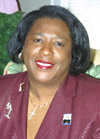Cancer support group culturally relevant
by Cindy AbolePublic Relations
The equation is so elementary. It's so simple, so child-like.
A group of women in the cozy living room, sharing the weight of a similar burden.
Together, in a sing-song rhythm they sing out the words to the popular children’s rhyme, “Sally Walker.”
Little Sally Walker sitting in a saucer
Weeping and a-moaning like a turtle dove.
Rise Sally Rise wipe your weeping eyes
Turn to the east, turn to the west
Turn to the one you love the best.
These words, so simplistic in meaning evoke a deeper sense of support and encouragement for the women who recite each verse.
The women gathered together share a common bond, spiritually and culturally. They are cancer patients and survivors who have endured a fearful event that may have broken their spirits but binds them in faith. They are members of a new Hollings Cancer Center (HCC) support program known as Rise-Sister-Rise.
In 1993, the Breast Cancer Resource Committee created this national cultural support program for African American women with breast cancer. It targets the needs of minority women by providing outreach and information that’s culturally-relevant to them.
Within South Carolina, breast cancer is the second leading cause of death among women. According to the National Cancer Institute, African American women are more likely to die from the disease than any other race or ethnic group.
 Cherry
Seabrook
Cherry
Seabrook
“It’s an excellent program,” said Cherry Seabrook, facilitator of South Carolina’s first chapter. Seabrook, who has worked in radiation oncology for more than 23 years, is also the founder of another multi-site cancer support group called, Second Chance. “We try to work to alleviate the natural fears associated with cancer. We also try to promote positive thoughts and thinking. Our efforts have certainly made a difference to many women.”
Last December, Seabrook was approached by HCC Wellness Prevention and Clinical Control Coordinator Michelle Peterson, R.N., and invited to attend the Rise-Sister-Rise four-day facilitator training session in Washington, D.C. She was impressed with what she heard and saw.
“I was struck by the confidence and empowerment among breast cancer survivors who were in attendance,” said Seabrook. “I wondered how could I get such a dynamic program working in the Charleston area.”
The Rise-Sister-Rise program celebrated its Lowcountry kick-off on April 21 at Father Figaro Hall in downtown Charleston. The event was sponsored by the American Cancer Society, Hollings Cancer Center, St. Patrick's Catholic Church Women's Guild, and the national Rise-Sister-Rise program. Of the 300 invitations sent, more than 240 people responded and attended the lively event which featured inspirational dance, song, poetry and talks from guest speakers including Hollings Cancer Center board member and advocate Zora Brown.
Wanting to add a personal and welcoming touch, Seabrook volunteers her house at 166 St. Margaret Street as the base for Second Chance and the new 16-week, alternative Saturday program. The facility features a comfortable living room, den-turned-conference room, dining area and kitchen. Participants and volunteers can come between appointments, radiation/chemotherapy treatments to enjoy a snack, read or sit among friends.
Seabrook leads each meeting with a prayer and organizes the sessions based on a variety of subjects that include coping skills, breast health, oncology nutrition, post-treatment rehabilitation, stress management and psychotherapy. Seabrook also invites physicians and other health professionals to discuss specific issues like treatment options and even death and dying.
Members who complete the program are encouraged to “give back” to the
community.